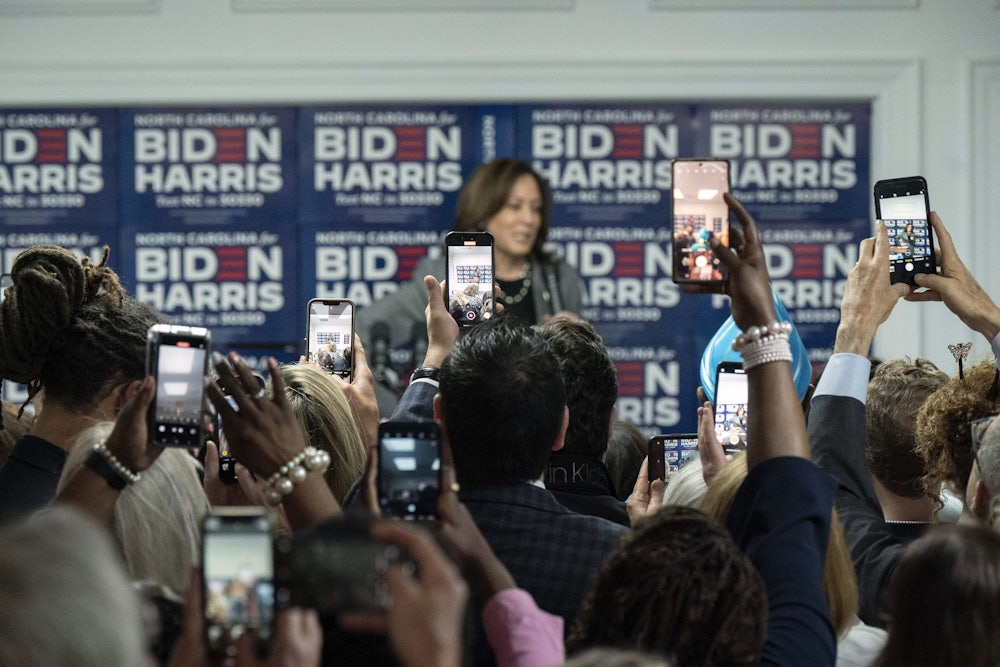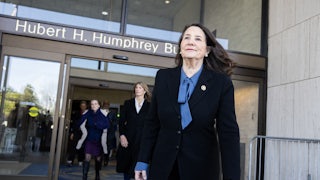My 18-year-old summer students came to class early last week and drew coconuts on the board—a reference to one of several rapidly spreading Kamala Harris campaign memes. When the vice president’s campaign video dropped, there was more enthusiasm in my classroom than I’ve seen even for the release of a major rap album or anime. Early polls show young people support Harris over Trump by a staggering margin.
Talk to Democratic voters almost anywhere, of any age, right now, and they’re glowing with optimism—maybe, for some, for the first time since Bernie won Nevada in 2020, or for others, since the early years of the Biden administration (remember that feeling when Trump was out of office and we were Building Back Better?).
Some of it is simple relief: Biden was too frail and doddering to defeat Trump, struggling to complete sentences, while, at 59, Harris is—by the standards of our gerontocracy—relatively young and vigorous. She sounds great and looks sensational (I sent a photo of her in her pink suit to a dandyish friend who agreed, adding, “Poor Hillary was the victim of decades of bad tailoring”). A former prosecutor, her aggressive stance toward the felon on top of the ticket is, well, brat.
But anti-Trump girlboss feelings, while powerful, do not account entirely for the national giddiness surrounding Kamala Harris, especially on the part of the young. On Twitter, ironic but affectionate coconut memes mask an earnest hope that her policies might be more progressive than those of some of the centrists that party bosses might have preferred (a hope fueled by Alexandria Ocasio-Cortez’s Instagram comments suggesting that the party’s donor class was hoping for someone more conservative than Harris). Many even regard Harris as more progressive than Biden.
Republicans share this perception and have already begun attacking Harris on this basis. Some in the media are concluding from these right-wing attacks that Harris’s perceived progressiveness is a liability. But the reality is that Harris’s progressive commitments could help her, and the whole Democratic ticket—if she doesn’t run away from them. They could be critical to voter turnout, especially among young people, people of color, and climate voters. The perception that Harris is progressive is not only motivating some voters, but also volunteers.
Harris is already running as a far more passionate champion of abortion rights than Biden, which is clearly helping her. Although there isn’t much evidence one way or another on how Harris would approach the genocide in Gaza, many observers view her as more compassionate toward the Palestinians and more dovish overall than Biden. She has also supported Medicare for All in the past, a core commitment of the Bernie Sanders left. She may also be a better messenger than Biden for the most popular aspects of Biden’s pro-labor and family-friendly economic policies, including investments in infrastructure.
Her perceived climate progressivism may be especially crucial. Her record here is decent. She has a record to point to. Not only did she back the Green New Deal in the Senate, but as California’s attorney general, she prosecuted big fossil fuel companies: suing Chevron and ConocoPhillips over hazardous waste and gas station violations, respectively. Harris also joined local district attorneys in suing a pipeline operator for polluting about a hundred miles of California coastline. She even created a specific environmental justice unit at the attorney general’s office, one of the first in the nation.
What’s worrisome—both to climate advocates and to anyone who would like to see her hold onto all this electorally favorable goodwill among the youth—is that when it comes to climate, Harris’s positions are rapidly shifting. She supported the Green New Deal in 2019, though she has since backed away from it. Last Friday, she also walked back her opposition to fracking, an issue about which Trump has been taunting her in Pennsylvania.
The fracking pivot might be electorally necessary, but running too far from her past climate advocacy would be a huge political mistake, given the urgency of the climate crisis and its salience to less committed voters (people who vote Democrat but aren’t reliably motivated to vote). Harris should revive her Green New Deal commitment and talk concretely about what that means in 2024, now that the nation has seen some large-scale investment in green infrastructure under Biden. The perception that Harris is an environmental champion is part of why she is popular, polls suggest.
Biden has been strong on climate compared to past presidents, but with the hottest summer on record and wildfires raging, Harris needs to go further to win over the most passionate voters and volunteers. She should run on continuing Biden’s strong regulatory agenda and commitment to renewable energy and outdo that record with a commitment to stop building new fossil fuel infrastructure (a huge weakness in the Biden administration, which allowed more new drilling than Trump did).
For its part, the youthful climate movement has been forcefully rejecting the Republican ticket, while urging Harris to lean into her strong climate history and not sell out to the industry. After protesting J.D. Vance—the vice presidential nominee has close ties to the fossil fuel industry and has questioned the role of humans in climate change—Sunrise marched to the Democratic National Committee headquarters this week with signs urging Harris to go big, with big banners encouraging her, “Harris: Fight for Young People.” The group previously sent Harris a letter, just three days after Biden dropped out, urging her to distance herself from Biden’s less popular policies, especially the war in Gaza and the easy approval of fossil fuel projects. They’ve also encouraged her to invest in green infrastructure for public schools and affordable housing, end fossil subsidies, and expand green jobs through the American Climate Corps.
In their letter, Sunrise told Harris, “Young people are energized and ready to fight against fascism and for the future we all deserve. This is your chance to energize young people and our communities to vote, mount one of the greatest political comebacks in decades, and deliver a resounding defeat to the far-right agenda of Trump and Vance.” Or, as the group put it more succinctly, retweeting Harris’s 2019 Green New Deal endorsement: “We would fall out of a coconut tree” to elect this version of Kamala Harris.
The vice president is surely hearing a lot of advice right now, much of it from big donors who may be close to the fossil fuel lobbies and who, as members of the top one percent, tend to resist change no matter what. The future doesn’t have its own lobbyists and doesn’t write big checks, but its closest representatives are young voters and the climate movement. In this close—and suddenly exciting—election, Kamala Harris and the rest of the Democrats ought to listen more to these emissaries of tomorrow. In urging Biden to drop out, and shifting to the ebullient and youthful Harris, the Democrats dispensed with tradition and ossified thinking, opting instead for common sense. That move has already been more successful than many expected, but only a strong, responsible platform can keep the momentum going. This is no time to let the soul-deadening donor-bound centrists and consultants kill the good vibes.








